Diploma of Nursing: Ethical Issues, Interventions in End-of-Life Care
VerifiedAdded on 2022/10/14
|6
|1949
|22
Essay
AI Summary
This essay addresses the ethical complexities encountered in end-of-life care, focusing on a case study of a 58-year-old patient with stage IV mesothelioma. It identifies key ethical issues such as withdrawal and withholding of life-sustaining therapy, hastening death, and medical futility. The essay explores nursing ethics, emphasizing patient autonomy and the importance of providing sufficient information for informed decision-making. It details nursing interventions, including palliative sedation, advance care planning, and ethical consultations, while considering the implications of current legislation like the Patient Self-Determination Act. Furthermore, the essay links consumer rights and responsibilities to ethical issues and outlines ethical principles such as autonomy, non-maleficence, and justice, demonstrating their application in managing end-of-life care. The essay concludes by highlighting the role of palliative care in enhancing the quality of life for individuals facing life-limiting illnesses and emphasizes the importance of ethical considerations in providing comprehensive care.
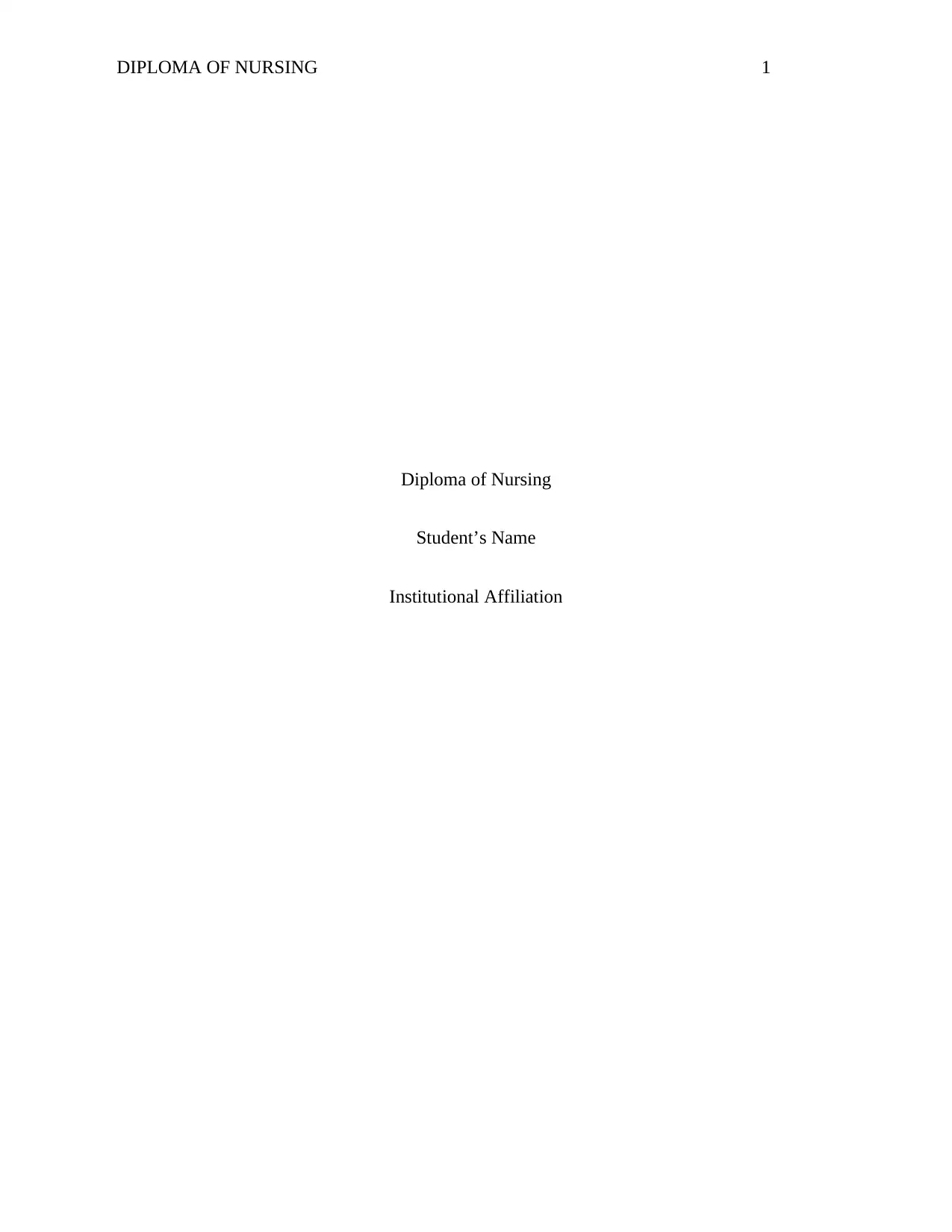
DIPLOMA OF NURSING 1
Diploma of Nursing
Student’s Name
Institutional Affiliation
Diploma of Nursing
Student’s Name
Institutional Affiliation
Paraphrase This Document
Need a fresh take? Get an instant paraphrase of this document with our AI Paraphraser
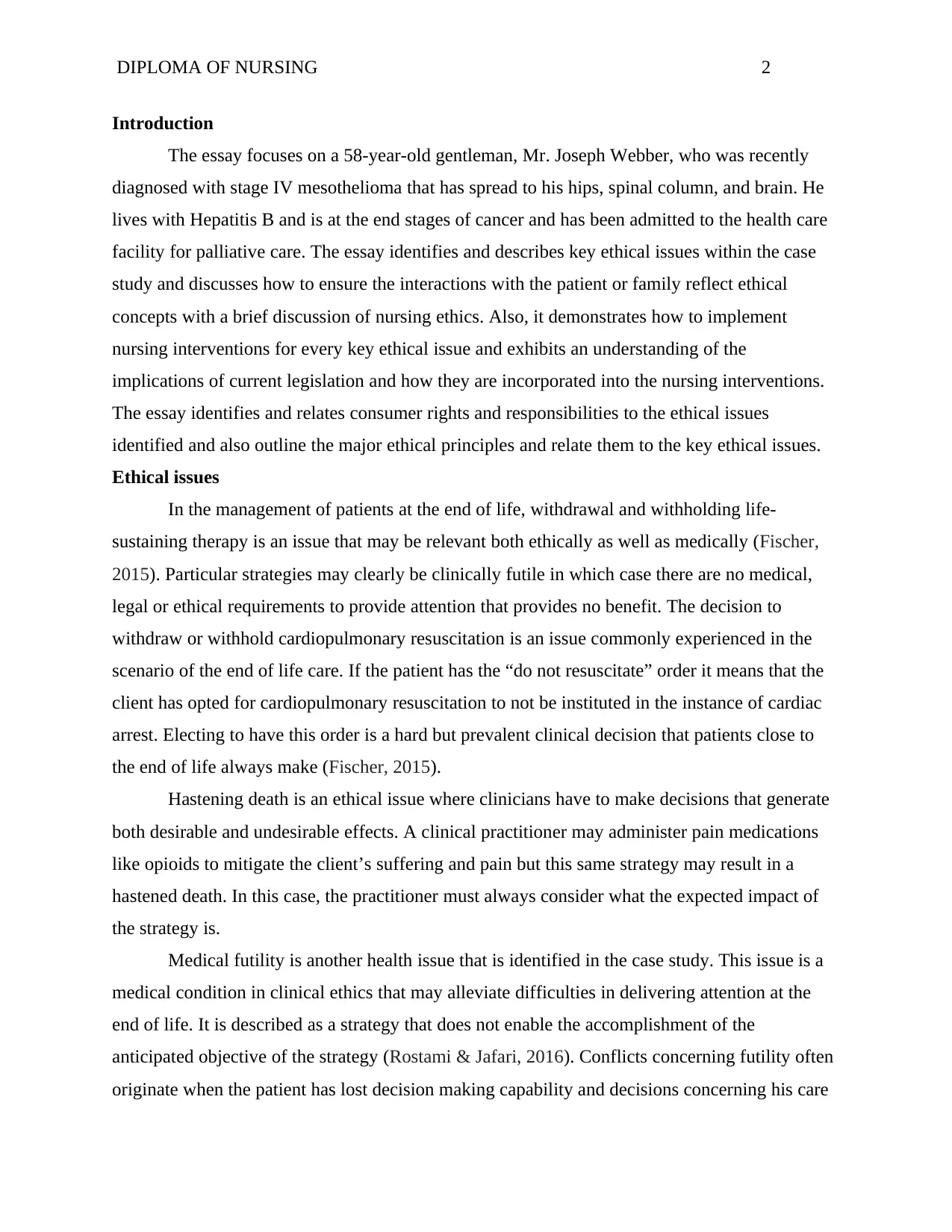
DIPLOMA OF NURSING 2
Introduction
The essay focuses on a 58-year-old gentleman, Mr. Joseph Webber, who was recently
diagnosed with stage IV mesothelioma that has spread to his hips, spinal column, and brain. He
lives with Hepatitis B and is at the end stages of cancer and has been admitted to the health care
facility for palliative care. The essay identifies and describes key ethical issues within the case
study and discusses how to ensure the interactions with the patient or family reflect ethical
concepts with a brief discussion of nursing ethics. Also, it demonstrates how to implement
nursing interventions for every key ethical issue and exhibits an understanding of the
implications of current legislation and how they are incorporated into the nursing interventions.
The essay identifies and relates consumer rights and responsibilities to the ethical issues
identified and also outline the major ethical principles and relate them to the key ethical issues.
Ethical issues
In the management of patients at the end of life, withdrawal and withholding life-
sustaining therapy is an issue that may be relevant both ethically as well as medically (Fischer,
2015). Particular strategies may clearly be clinically futile in which case there are no medical,
legal or ethical requirements to provide attention that provides no benefit. The decision to
withdraw or withhold cardiopulmonary resuscitation is an issue commonly experienced in the
scenario of the end of life care. If the patient has the “do not resuscitate” order it means that the
client has opted for cardiopulmonary resuscitation to not be instituted in the instance of cardiac
arrest. Electing to have this order is a hard but prevalent clinical decision that patients close to
the end of life always make (Fischer, 2015).
Hastening death is an ethical issue where clinicians have to make decisions that generate
both desirable and undesirable effects. A clinical practitioner may administer pain medications
like opioids to mitigate the client’s suffering and pain but this same strategy may result in a
hastened death. In this case, the practitioner must always consider what the expected impact of
the strategy is.
Medical futility is another health issue that is identified in the case study. This issue is a
medical condition in clinical ethics that may alleviate difficulties in delivering attention at the
end of life. It is described as a strategy that does not enable the accomplishment of the
anticipated objective of the strategy (Rostami & Jafari, 2016). Conflicts concerning futility often
originate when the patient has lost decision making capability and decisions concerning his care
Introduction
The essay focuses on a 58-year-old gentleman, Mr. Joseph Webber, who was recently
diagnosed with stage IV mesothelioma that has spread to his hips, spinal column, and brain. He
lives with Hepatitis B and is at the end stages of cancer and has been admitted to the health care
facility for palliative care. The essay identifies and describes key ethical issues within the case
study and discusses how to ensure the interactions with the patient or family reflect ethical
concepts with a brief discussion of nursing ethics. Also, it demonstrates how to implement
nursing interventions for every key ethical issue and exhibits an understanding of the
implications of current legislation and how they are incorporated into the nursing interventions.
The essay identifies and relates consumer rights and responsibilities to the ethical issues
identified and also outline the major ethical principles and relate them to the key ethical issues.
Ethical issues
In the management of patients at the end of life, withdrawal and withholding life-
sustaining therapy is an issue that may be relevant both ethically as well as medically (Fischer,
2015). Particular strategies may clearly be clinically futile in which case there are no medical,
legal or ethical requirements to provide attention that provides no benefit. The decision to
withdraw or withhold cardiopulmonary resuscitation is an issue commonly experienced in the
scenario of the end of life care. If the patient has the “do not resuscitate” order it means that the
client has opted for cardiopulmonary resuscitation to not be instituted in the instance of cardiac
arrest. Electing to have this order is a hard but prevalent clinical decision that patients close to
the end of life always make (Fischer, 2015).
Hastening death is an ethical issue where clinicians have to make decisions that generate
both desirable and undesirable effects. A clinical practitioner may administer pain medications
like opioids to mitigate the client’s suffering and pain but this same strategy may result in a
hastened death. In this case, the practitioner must always consider what the expected impact of
the strategy is.
Medical futility is another health issue that is identified in the case study. This issue is a
medical condition in clinical ethics that may alleviate difficulties in delivering attention at the
end of life. It is described as a strategy that does not enable the accomplishment of the
anticipated objective of the strategy (Rostami & Jafari, 2016). Conflicts concerning futility often
originate when the patient has lost decision making capability and decisions concerning his care
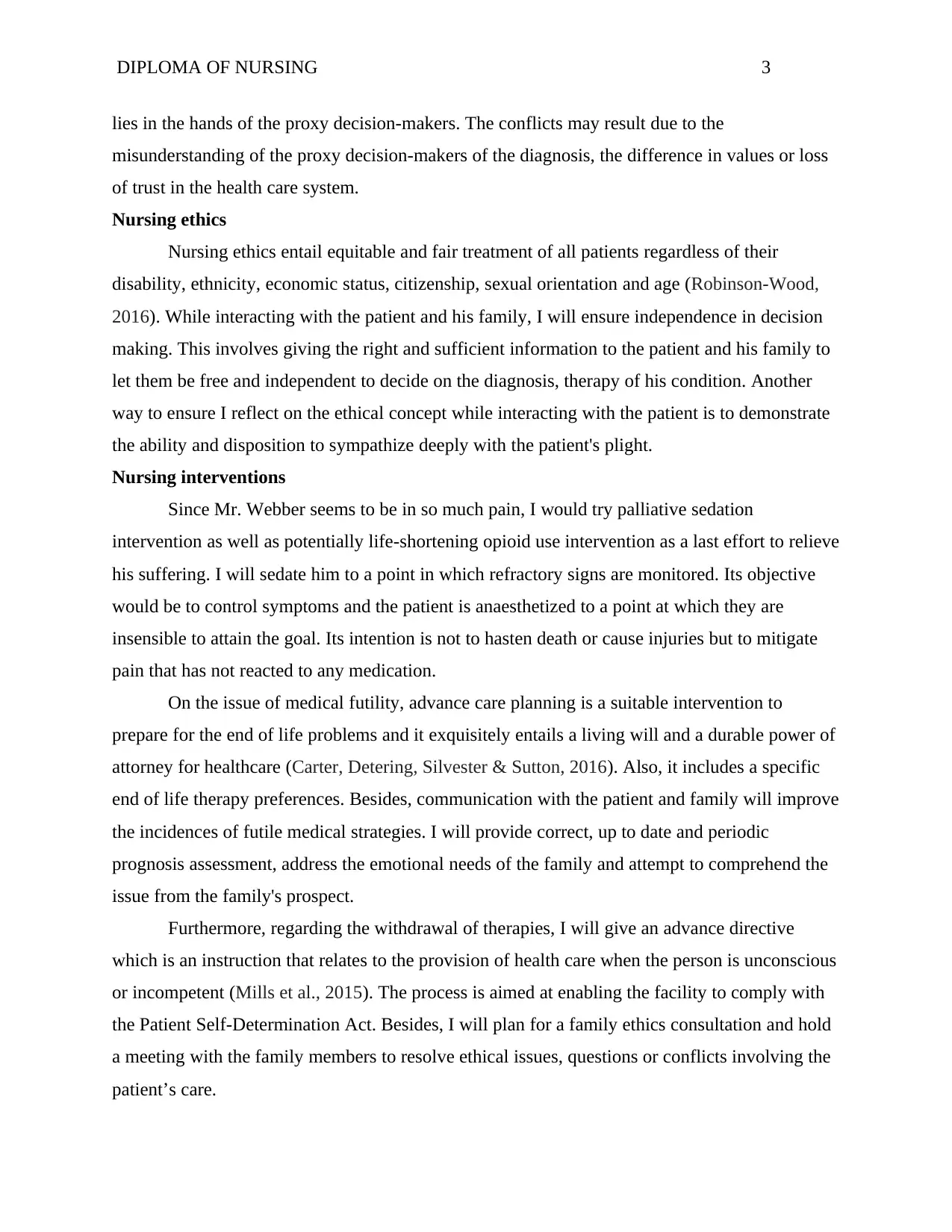
DIPLOMA OF NURSING 3
lies in the hands of the proxy decision-makers. The conflicts may result due to the
misunderstanding of the proxy decision-makers of the diagnosis, the difference in values or loss
of trust in the health care system.
Nursing ethics
Nursing ethics entail equitable and fair treatment of all patients regardless of their
disability, ethnicity, economic status, citizenship, sexual orientation and age (Robinson-Wood,
2016). While interacting with the patient and his family, I will ensure independence in decision
making. This involves giving the right and sufficient information to the patient and his family to
let them be free and independent to decide on the diagnosis, therapy of his condition. Another
way to ensure I reflect on the ethical concept while interacting with the patient is to demonstrate
the ability and disposition to sympathize deeply with the patient's plight.
Nursing interventions
Since Mr. Webber seems to be in so much pain, I would try palliative sedation
intervention as well as potentially life-shortening opioid use intervention as a last effort to relieve
his suffering. I will sedate him to a point in which refractory signs are monitored. Its objective
would be to control symptoms and the patient is anaesthetized to a point at which they are
insensible to attain the goal. Its intention is not to hasten death or cause injuries but to mitigate
pain that has not reacted to any medication.
On the issue of medical futility, advance care planning is a suitable intervention to
prepare for the end of life problems and it exquisitely entails a living will and a durable power of
attorney for healthcare (Carter, Detering, Silvester & Sutton, 2016). Also, it includes a specific
end of life therapy preferences. Besides, communication with the patient and family will improve
the incidences of futile medical strategies. I will provide correct, up to date and periodic
prognosis assessment, address the emotional needs of the family and attempt to comprehend the
issue from the family's prospect.
Furthermore, regarding the withdrawal of therapies, I will give an advance directive
which is an instruction that relates to the provision of health care when the person is unconscious
or incompetent (Mills et al., 2015). The process is aimed at enabling the facility to comply with
the Patient Self-Determination Act. Besides, I will plan for a family ethics consultation and hold
a meeting with the family members to resolve ethical issues, questions or conflicts involving the
patient’s care.
lies in the hands of the proxy decision-makers. The conflicts may result due to the
misunderstanding of the proxy decision-makers of the diagnosis, the difference in values or loss
of trust in the health care system.
Nursing ethics
Nursing ethics entail equitable and fair treatment of all patients regardless of their
disability, ethnicity, economic status, citizenship, sexual orientation and age (Robinson-Wood,
2016). While interacting with the patient and his family, I will ensure independence in decision
making. This involves giving the right and sufficient information to the patient and his family to
let them be free and independent to decide on the diagnosis, therapy of his condition. Another
way to ensure I reflect on the ethical concept while interacting with the patient is to demonstrate
the ability and disposition to sympathize deeply with the patient's plight.
Nursing interventions
Since Mr. Webber seems to be in so much pain, I would try palliative sedation
intervention as well as potentially life-shortening opioid use intervention as a last effort to relieve
his suffering. I will sedate him to a point in which refractory signs are monitored. Its objective
would be to control symptoms and the patient is anaesthetized to a point at which they are
insensible to attain the goal. Its intention is not to hasten death or cause injuries but to mitigate
pain that has not reacted to any medication.
On the issue of medical futility, advance care planning is a suitable intervention to
prepare for the end of life problems and it exquisitely entails a living will and a durable power of
attorney for healthcare (Carter, Detering, Silvester & Sutton, 2016). Also, it includes a specific
end of life therapy preferences. Besides, communication with the patient and family will improve
the incidences of futile medical strategies. I will provide correct, up to date and periodic
prognosis assessment, address the emotional needs of the family and attempt to comprehend the
issue from the family's prospect.
Furthermore, regarding the withdrawal of therapies, I will give an advance directive
which is an instruction that relates to the provision of health care when the person is unconscious
or incompetent (Mills et al., 2015). The process is aimed at enabling the facility to comply with
the Patient Self-Determination Act. Besides, I will plan for a family ethics consultation and hold
a meeting with the family members to resolve ethical issues, questions or conflicts involving the
patient’s care.
⊘ This is a preview!⊘
Do you want full access?
Subscribe today to unlock all pages.

Trusted by 1+ million students worldwide
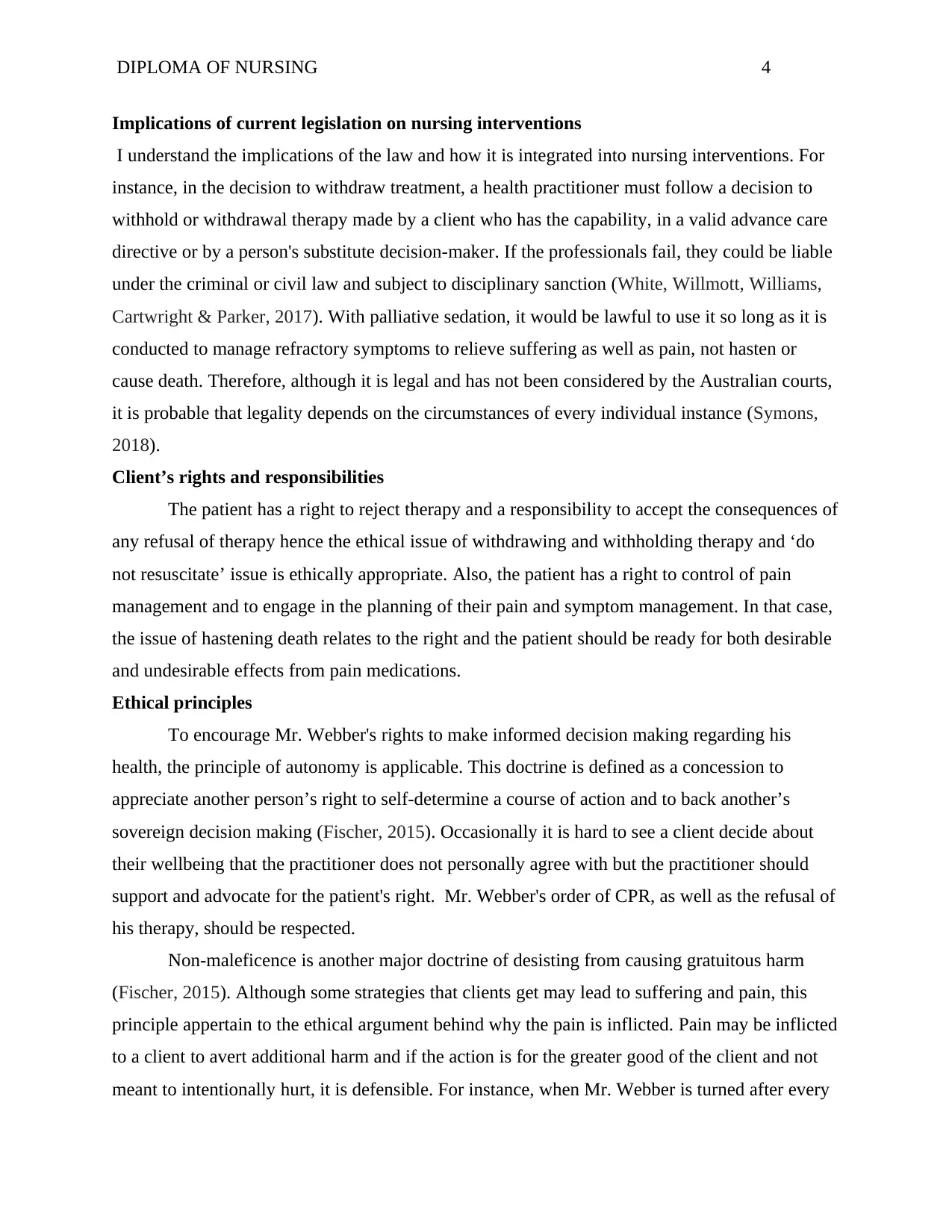
DIPLOMA OF NURSING 4
Implications of current legislation on nursing interventions
I understand the implications of the law and how it is integrated into nursing interventions. For
instance, in the decision to withdraw treatment, a health practitioner must follow a decision to
withhold or withdrawal therapy made by a client who has the capability, in a valid advance care
directive or by a person's substitute decision-maker. If the professionals fail, they could be liable
under the criminal or civil law and subject to disciplinary sanction (White, Willmott, Williams,
Cartwright & Parker, 2017). With palliative sedation, it would be lawful to use it so long as it is
conducted to manage refractory symptoms to relieve suffering as well as pain, not hasten or
cause death. Therefore, although it is legal and has not been considered by the Australian courts,
it is probable that legality depends on the circumstances of every individual instance (Symons,
2018).
Client’s rights and responsibilities
The patient has a right to reject therapy and a responsibility to accept the consequences of
any refusal of therapy hence the ethical issue of withdrawing and withholding therapy and ‘do
not resuscitate’ issue is ethically appropriate. Also, the patient has a right to control of pain
management and to engage in the planning of their pain and symptom management. In that case,
the issue of hastening death relates to the right and the patient should be ready for both desirable
and undesirable effects from pain medications.
Ethical principles
To encourage Mr. Webber's rights to make informed decision making regarding his
health, the principle of autonomy is applicable. This doctrine is defined as a concession to
appreciate another person’s right to self-determine a course of action and to back another’s
sovereign decision making (Fischer, 2015). Occasionally it is hard to see a client decide about
their wellbeing that the practitioner does not personally agree with but the practitioner should
support and advocate for the patient's right. Mr. Webber's order of CPR, as well as the refusal of
his therapy, should be respected.
Non-maleficence is another major doctrine of desisting from causing gratuitous harm
(Fischer, 2015). Although some strategies that clients get may lead to suffering and pain, this
principle appertain to the ethical argument behind why the pain is inflicted. Pain may be inflicted
to a client to avert additional harm and if the action is for the greater good of the client and not
meant to intentionally hurt, it is defensible. For instance, when Mr. Webber is turned after every
Implications of current legislation on nursing interventions
I understand the implications of the law and how it is integrated into nursing interventions. For
instance, in the decision to withdraw treatment, a health practitioner must follow a decision to
withhold or withdrawal therapy made by a client who has the capability, in a valid advance care
directive or by a person's substitute decision-maker. If the professionals fail, they could be liable
under the criminal or civil law and subject to disciplinary sanction (White, Willmott, Williams,
Cartwright & Parker, 2017). With palliative sedation, it would be lawful to use it so long as it is
conducted to manage refractory symptoms to relieve suffering as well as pain, not hasten or
cause death. Therefore, although it is legal and has not been considered by the Australian courts,
it is probable that legality depends on the circumstances of every individual instance (Symons,
2018).
Client’s rights and responsibilities
The patient has a right to reject therapy and a responsibility to accept the consequences of
any refusal of therapy hence the ethical issue of withdrawing and withholding therapy and ‘do
not resuscitate’ issue is ethically appropriate. Also, the patient has a right to control of pain
management and to engage in the planning of their pain and symptom management. In that case,
the issue of hastening death relates to the right and the patient should be ready for both desirable
and undesirable effects from pain medications.
Ethical principles
To encourage Mr. Webber's rights to make informed decision making regarding his
health, the principle of autonomy is applicable. This doctrine is defined as a concession to
appreciate another person’s right to self-determine a course of action and to back another’s
sovereign decision making (Fischer, 2015). Occasionally it is hard to see a client decide about
their wellbeing that the practitioner does not personally agree with but the practitioner should
support and advocate for the patient's right. Mr. Webber's order of CPR, as well as the refusal of
his therapy, should be respected.
Non-maleficence is another major doctrine of desisting from causing gratuitous harm
(Fischer, 2015). Although some strategies that clients get may lead to suffering and pain, this
principle appertain to the ethical argument behind why the pain is inflicted. Pain may be inflicted
to a client to avert additional harm and if the action is for the greater good of the client and not
meant to intentionally hurt, it is defensible. For instance, when Mr. Webber is turned after every
Paraphrase This Document
Need a fresh take? Get an instant paraphrase of this document with our AI Paraphraser
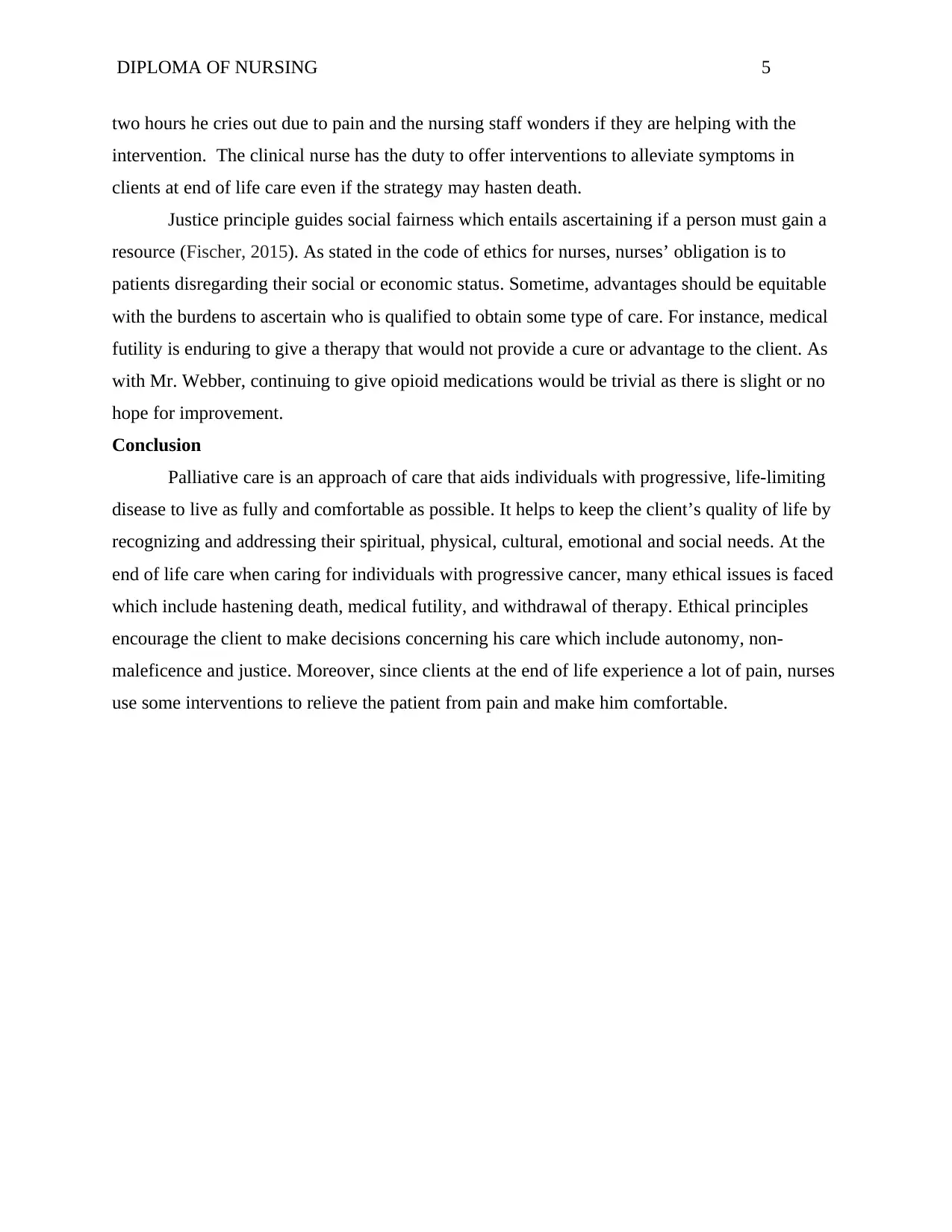
DIPLOMA OF NURSING 5
two hours he cries out due to pain and the nursing staff wonders if they are helping with the
intervention. The clinical nurse has the duty to offer interventions to alleviate symptoms in
clients at end of life care even if the strategy may hasten death.
Justice principle guides social fairness which entails ascertaining if a person must gain a
resource (Fischer, 2015). As stated in the code of ethics for nurses, nurses’ obligation is to
patients disregarding their social or economic status. Sometime, advantages should be equitable
with the burdens to ascertain who is qualified to obtain some type of care. For instance, medical
futility is enduring to give a therapy that would not provide a cure or advantage to the client. As
with Mr. Webber, continuing to give opioid medications would be trivial as there is slight or no
hope for improvement.
Conclusion
Palliative care is an approach of care that aids individuals with progressive, life-limiting
disease to live as fully and comfortable as possible. It helps to keep the client’s quality of life by
recognizing and addressing their spiritual, physical, cultural, emotional and social needs. At the
end of life care when caring for individuals with progressive cancer, many ethical issues is faced
which include hastening death, medical futility, and withdrawal of therapy. Ethical principles
encourage the client to make decisions concerning his care which include autonomy, non-
maleficence and justice. Moreover, since clients at the end of life experience a lot of pain, nurses
use some interventions to relieve the patient from pain and make him comfortable.
two hours he cries out due to pain and the nursing staff wonders if they are helping with the
intervention. The clinical nurse has the duty to offer interventions to alleviate symptoms in
clients at end of life care even if the strategy may hasten death.
Justice principle guides social fairness which entails ascertaining if a person must gain a
resource (Fischer, 2015). As stated in the code of ethics for nurses, nurses’ obligation is to
patients disregarding their social or economic status. Sometime, advantages should be equitable
with the burdens to ascertain who is qualified to obtain some type of care. For instance, medical
futility is enduring to give a therapy that would not provide a cure or advantage to the client. As
with Mr. Webber, continuing to give opioid medications would be trivial as there is slight or no
hope for improvement.
Conclusion
Palliative care is an approach of care that aids individuals with progressive, life-limiting
disease to live as fully and comfortable as possible. It helps to keep the client’s quality of life by
recognizing and addressing their spiritual, physical, cultural, emotional and social needs. At the
end of life care when caring for individuals with progressive cancer, many ethical issues is faced
which include hastening death, medical futility, and withdrawal of therapy. Ethical principles
encourage the client to make decisions concerning his care which include autonomy, non-
maleficence and justice. Moreover, since clients at the end of life experience a lot of pain, nurses
use some interventions to relieve the patient from pain and make him comfortable.
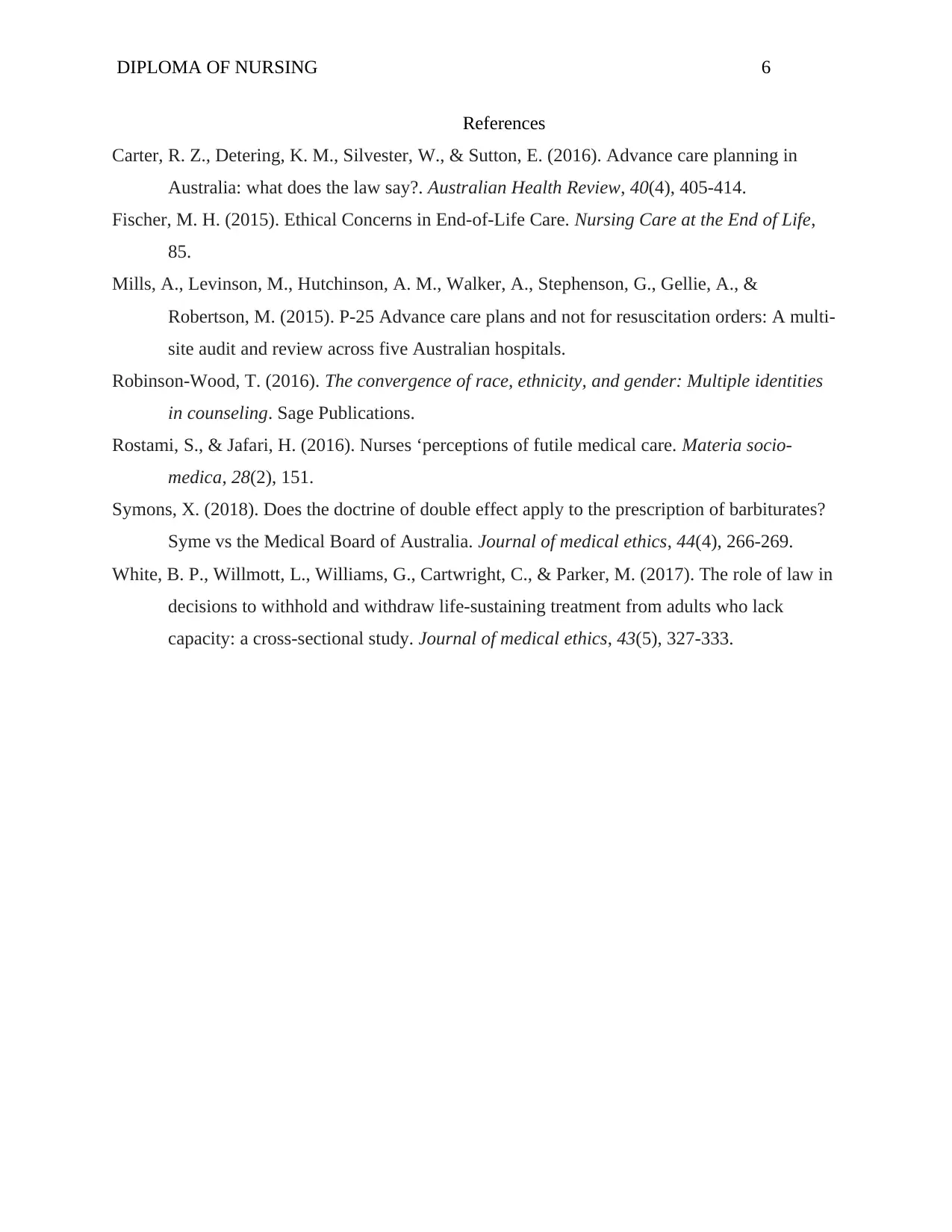
DIPLOMA OF NURSING 6
References
Carter, R. Z., Detering, K. M., Silvester, W., & Sutton, E. (2016). Advance care planning in
Australia: what does the law say?. Australian Health Review, 40(4), 405-414.
Fischer, M. H. (2015). Ethical Concerns in End-of-Life Care. Nursing Care at the End of Life,
85.
Mills, A., Levinson, M., Hutchinson, A. M., Walker, A., Stephenson, G., Gellie, A., &
Robertson, M. (2015). P-25 Advance care plans and not for resuscitation orders: A multi-
site audit and review across five Australian hospitals.
Robinson-Wood, T. (2016). The convergence of race, ethnicity, and gender: Multiple identities
in counseling. Sage Publications.
Rostami, S., & Jafari, H. (2016). Nurses ‘perceptions of futile medical care. Materia socio-
medica, 28(2), 151.
Symons, X. (2018). Does the doctrine of double effect apply to the prescription of barbiturates?
Syme vs the Medical Board of Australia. Journal of medical ethics, 44(4), 266-269.
White, B. P., Willmott, L., Williams, G., Cartwright, C., & Parker, M. (2017). The role of law in
decisions to withhold and withdraw life-sustaining treatment from adults who lack
capacity: a cross-sectional study. Journal of medical ethics, 43(5), 327-333.
References
Carter, R. Z., Detering, K. M., Silvester, W., & Sutton, E. (2016). Advance care planning in
Australia: what does the law say?. Australian Health Review, 40(4), 405-414.
Fischer, M. H. (2015). Ethical Concerns in End-of-Life Care. Nursing Care at the End of Life,
85.
Mills, A., Levinson, M., Hutchinson, A. M., Walker, A., Stephenson, G., Gellie, A., &
Robertson, M. (2015). P-25 Advance care plans and not for resuscitation orders: A multi-
site audit and review across five Australian hospitals.
Robinson-Wood, T. (2016). The convergence of race, ethnicity, and gender: Multiple identities
in counseling. Sage Publications.
Rostami, S., & Jafari, H. (2016). Nurses ‘perceptions of futile medical care. Materia socio-
medica, 28(2), 151.
Symons, X. (2018). Does the doctrine of double effect apply to the prescription of barbiturates?
Syme vs the Medical Board of Australia. Journal of medical ethics, 44(4), 266-269.
White, B. P., Willmott, L., Williams, G., Cartwright, C., & Parker, M. (2017). The role of law in
decisions to withhold and withdraw life-sustaining treatment from adults who lack
capacity: a cross-sectional study. Journal of medical ethics, 43(5), 327-333.
⊘ This is a preview!⊘
Do you want full access?
Subscribe today to unlock all pages.

Trusted by 1+ million students worldwide
1 out of 6
Related Documents
Your All-in-One AI-Powered Toolkit for Academic Success.
+13062052269
info@desklib.com
Available 24*7 on WhatsApp / Email
![[object Object]](/_next/static/media/star-bottom.7253800d.svg)
Unlock your academic potential
Copyright © 2020–2026 A2Z Services. All Rights Reserved. Developed and managed by ZUCOL.





